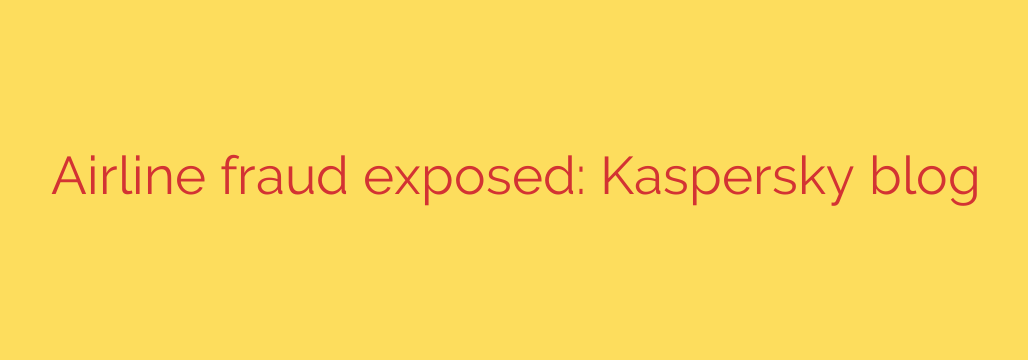
Is Your Frequent Flyer Account Safe? How Hackers Steal Your Airline Miles
For millions of travelers, frequent flyer miles are more than just points; they’re a valuable currency earned through loyalty and countless hours in the air. These miles can unlock dream vacations, coveted seat upgrades, and exclusive travel perks. But this value has also caught the attention of cybercriminals, who now actively target airline loyalty programs as a source of easy profit.
Your frequent flyer account is a treasure trove of sensitive information, often containing your full name, date of birth, contact details, and sometimes even passport and payment information. For a hacker, gaining access isn’t just about the miles—it’s about a complete profile ripe for identity theft. Understanding their methods is the first step toward protecting your hard-earned rewards.
The Criminal Playbook: How Your Miles Are Stolen
Cybercriminals use several proven tactics to compromise airline loyalty accounts. These methods often rely on exploiting common human errors rather than complex technical breaches, making user awareness a critical line of defense.
Deceptive Phishing Scams: The most common attack vector is phishing. Criminals craft official-looking emails that appear to be from your airline. These messages create a sense of urgency with subject lines like “Your Account Has Been Suspended” or “Claim Your Bonus Miles Now!” The goal is to trick you into clicking a link that leads to a fake login page. Once you enter your username and password, the criminals capture your credentials and gain full access to your account.
Credential Stuffing: Many people reuse the same password across multiple websites. Hackers take advantage of this by using massive lists of usernames and passwords stolen from other data breaches (like a social media site or online retailer) and “stuffing” them into the airline’s login portal. If your password is the same, their automated software will find a match and unlock your account in seconds.
Malware and Spyware: Malicious software on your computer or phone can secretly record your keystrokes, capturing your login details for every site you visit, including your airline account. This type of malware is often contracted by clicking on suspicious links or downloading unverified attachments, and can even be a risk when using unsecured public Wi-Fi networks.
What Happens to a Hacked Frequent Flyer Account?
Once a criminal has control of your account, they move quickly to cash in. The stolen miles are often monetized in one of several ways:
- Sold on the Dark Web: Your account login or the miles themselves are sold to buyers on illicit online marketplaces for a fraction of their actual value.
- Used for Fraudulent Travel: Criminals use your miles to book flights and hotel stays for themselves or for their “clients,” who pay them in untraceable currency.
- Personal Information Harvested: All the personal data in your profile is copied and either sold or used for more sophisticated identity theft schemes.
By the time you notice the missing miles—which could be weeks or months later—the damage has been done, and recovering them can be a difficult and lengthy process.
Your Action Plan: How to Protect Your Airline Miles
Securing your frequent flyer account requires the same vigilance as protecting your online bank account. By taking a few proactive steps, you can significantly reduce your risk of becoming a victim.
Create a Strong, Unique Password: This is your first and most important defense. Avoid common words, birthdays, or pet names. Instead, use a long combination of upper and lowercase letters, numbers, and symbols. Most importantly, never reuse your airline password on any other website. A password manager can help you create and store complex passwords for all your accounts.
Enable Two-Factor Authentication (2FA): If your airline’s loyalty program offers 2FA, enable it immediately. This adds a critical layer of security by requiring a second verification step—usually a code sent to your phone—in addition to your password. Even if a criminal steals your password, they won’t be able to log in without access to your phone.
Scrutinize Every Email: Before clicking any link in an email from an airline, carefully inspect the sender’s address to ensure it’s legitimate. Hover your mouse over links to see the actual destination URL. If you have any doubts, do not click the link. Instead, go directly to the airline’s official website by typing the address into your browser and log in from there.
Monitor Your Account Regularly: Don’t let your miles sit unchecked for months. Log in to your frequent flyer account at least once a month to review your balance and recent activity. This allows you to spot unauthorized transactions quickly and report them to the airline.
Secure Your Devices: Ensure the computers and mobile devices you use to access your account are protected with reputable antivirus and anti-malware software. When traveling, avoid logging into sensitive accounts on public Wi-Fi networks unless you are using a trusted Virtual Private Network (VPN) to encrypt your connection.
Your travel rewards are a valuable asset you’ve worked hard to accumulate. By treating your frequent flyer account with the security it deserves, you can ensure you’re the only one enjoying the benefits of your loyalty.
Source: https://www.kaspersky.com/blog/airline-brands-scheme/54539/








